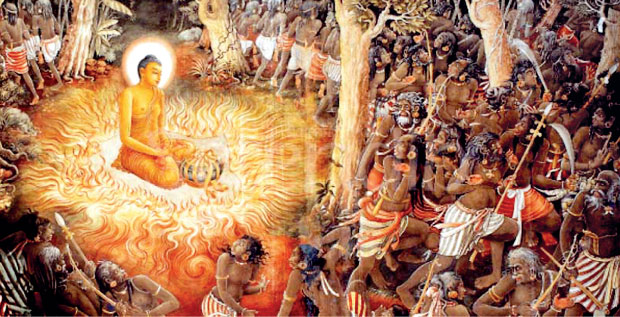01 Jan 2018 - {{hitsCtrl.values.hits}}

Duruthu Poya celebrates Buddha’s significant first visit to Sri Lanka two thousand five hundred years ago and nine months after his Enlightenment: it marks the country’s commencement of teachings of Buddhism.
 When the full moon radiates its light over the land of Sri Lanka, followers of the Buddhist teachings engage in meditation and meritorious deeds. Duruthu is the first full moon Poya of the year, in the month of January. This year there are two full moon poya days in the month of January this year, the second known as Adhi Duruthu falls on 31st.
When the full moon radiates its light over the land of Sri Lanka, followers of the Buddhist teachings engage in meditation and meritorious deeds. Duruthu is the first full moon Poya of the year, in the month of January. This year there are two full moon poya days in the month of January this year, the second known as Adhi Duruthu falls on 31st.
Mahavamsa, the ancient chronicle records the splendid saga which took place of nine months after Buddha’s Enlightenment was to restore peace and dispel war and violence, his visit to Mahiyangana had a noble purpose. It was to free the land from the evil doing Yakkhas. Hostility with the two main tribes the Yakkhas and Nagas who were in constant confrontation. The Enlightened One arrived at the Mahanaga Grove Mahiyangana on a Duruthu Full Moon Poya day.
Buddha stood before the congregation of Yakkhas radiating an aura of rainbow-hued rays from his body. The Yakkhas were conquered. Then the Buddha preached the message of non-violent coexistence to those who assembled to hear his words. Sumana Saman was one of them who attained Sovan, the first of the four stages leading to Nirvana. A few locks of Buddha’s hair (Kesa Dhathu) were deposited in a casket which Sumana enshrined in a small dagoba built at the site where all this transpired; it is now known as the Mahiyangana Raja Maha Vihara. This is country’s first stupa. The collar bone relic or Greeva Dhathu, which was recovered from the funeral pyre of the Buddha too was brought to the island by Arahant Sarabha Thera. It was enshrined in the dagoba reconstructed by The Prince Uddachulabhaya, brother of King Devanampiyatissa at Mahiyangana Maha Vihara.
However, the focus of Duruthu is centred round Kelaniya, where the annual Duruthu Perahera is conducted by the Raja Maha Viharaya which stands on a small mount just by the Southern Bank of Kelani river.
When the full moon radiates its light over the land of Sri Lanka, followers of the Buddhist teachings engage in meditation and meritorious deeds. Duruthu is the first full moon Poya of the year, in the month of January
Merit Transferin Milindapanha
The King Milinda in Milindapanha conveys the idea that if the beneficiary is not mindful of a gift of merit being offered, the giver gets no advantage thereby. Naagasena quotes a few examples to prove that is wrong. The disparity is that the act of transfer is an act of unselfishness and the feedback of the action on oneself has a purification effect, as well as on the person to whom the act is aimed at. Naagasena says, “Milinda, If a person transfers merit, that merit expands and grows more and more, during the process of transferring it, and the merit of that presentation he is able toshare out it to whomsoever he will.”
Buddha says that in a society exploited by differences and disagreements, a person called Mahasammata chosen from among them should maintain and preserve peace through laws of virtue. He should stick to standards of transparency, authority, and accountability. In Maha Sudassana and the Chakkavatti Sihanada Suttas Buddha detailed this when he talk about the Dhasaraja Dhamma.
‘Acts of merit’ bring Joy and happiness to the doer in this world and in the next.
“As a stream must flow and reach and fill the far-away main,
what is given here will reach and consecrate the spirits.
Water poured on mountain top would soon tumble down and fill the plain
like what is given here will get to and bless the feelings there.”
- Nidhikanda Sutra
Punna in Pali is a notion in Buddhism and Hinduism. As a result of good deeds Merit is accumulated and carries over through the life and the subsequent births. There are a number of ways in which merit can be gained. The Sutra suggests ten different ways in which it can occur. According to The Great Vows of Ksitigarbha Bodhisattva Sutta of Mahayana one can transfer one-seventh of the merit of an act to a loved one who is no more, to lessen the decease’s misery in their new lives.
Mahyana or Theravada Concept?
Some Western scholars of Buddhism, thought that the transfer of merit was a Mahayana concept developed at a late era and that it was rather harsh with Buddhist perceptions of karma hypothesis. Heinz Bechert, believes the doctrine in its developed form to a period between the 5th and 7th centuries. However, Anthony Barber differs in his views—merit transfer was an essential part of Buddhism practised from Buddha’s times. Buddhism teaches that the accrued merit can be transferred, can be shared with others; it is reversible and the persons who receive can be either living or dead.
The method of transfer is quite simple; the doer has only to wish that the merit he has gained accumulate to an important person in particular, or to ‘all beings’, a desire purely mental or expressed by words. All actions, according to the Buddha, what really matters is thought. Transference is mainly an act of the mind. Tirokuddha Sutta – Khuddakanipatha says, there is no use in lamenting, weeping, feeling sorry and bewailing; such approaches are of no effect to the departed ones. Some simply waste on hollow rituals and performances in commemoration of departed ones. They do not realize that it is not possible to assist the dead simply by constructing graveyards, Monuments, tombs, and other paraphernalia; instead performing some meritorious acts like building temples, orphanages, schools, libraries, hospitals, or distributing Dhamma books and other many related charitable activities.
MAY ALL BEINGS BE HAPPY!
23 Nov 2024 23 Nov 2024
23 Nov 2024 23 Nov 2024
23 Nov 2024 23 Nov 2024
23 Nov 2024 23 Nov 2024
23 Nov 2024 23 Nov 2024